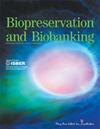血清代谢物与生物库血清样本的血清指标和分析前因素的关系
IF 1.4
4区 生物学
Biopreservation and Biobanking
Pub Date : 2025-04-01
Epub Date: 2024-07-08
DOI:10.1089/bio.2023.0130
引用次数: 0
摘要
背景:众所周知,血清指数(溶血、黄疸和脂血;HIL)会影响临床化学分析结果。本研究旨在探讨 HIL 指数对血清代谢物谱的影响,以及血清代谢物水平与血清样本分析前因素的关联。研究方法我们对韩国基因组与流行病学研究(KoGES)的一组血清样本(n = 12,196)进行了HIL指数和血清采集过程中产生的分析前变量(SPRECs)分析。我们还使用 Absolute IDQ p180 试剂盒对溶血组(n = 60)、黄疸组(n = 60)、脂血组(n = 60)和非 HIL 样品的普通对照组(n = 60)进行了靶向代谢组学分析。结果我们发现有 22 种临床生化分析物与溶血、25 种与黄疸、24 种与脂血明显相关(P < 0.0001)。血清代谢物(n = 27)与所有溶血、黄疸和脂血相关(p < 0.05)。PC ae C36 2与分析前因素有显著关联,这些因素分别对应于SPREC的第三要素(离心前处理延迟)和第六要素(离心后)。结论本研究显示了血清指数和分析前因素与血清代谢物谱的关联。此外,分析前因素与血清代谢物浓度的关联也证实了 SPRECs 在生物库血清样本质量控制中的实用性。本文章由计算机程序翻译,如有差异,请以英文原文为准。
Association of Serum Metabolites with Serum Indices and Preanalytical Factors of Biobanked Serum Samples.
求助全文
通过发布文献求助,成功后即可免费获取论文全文。
去求助
来源期刊

Biopreservation and Biobanking
Biochemistry, Genetics and Molecular Biology-General Biochemistry,Genetics and Molecular Biology
自引率
12.50%
发文量
114
期刊介绍:
Biopreservation and Biobanking is the first journal to provide a unifying forum for the peer-reviewed communication of recent advances in the emerging and evolving field of biospecimen procurement, processing, preservation and banking, distribution, and use. The Journal publishes a range of original articles focusing on current challenges and problems in biopreservation, and advances in methods to address these issues related to the processing of macromolecules, cells, and tissues for research.
In a new section dedicated to Emerging Markets and Technologies, the Journal highlights the emergence of new markets and technologies that are either adopting or disrupting the biobank framework as they imprint on society. The solutions presented here are anticipated to help drive innovation within the biobank community.
Biopreservation and Biobanking also explores the ethical, legal, and societal considerations surrounding biobanking and biorepository operation. Ideas and practical solutions relevant to improved quality, efficiency, and sustainability of repositories, and relating to their management, operation and oversight are discussed as well.
 求助内容:
求助内容: 应助结果提醒方式:
应助结果提醒方式:


